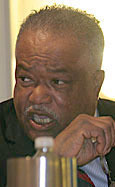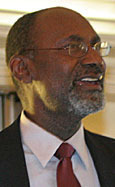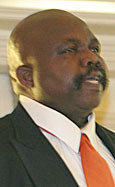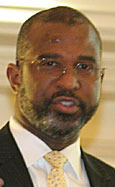Panel: Minority, beginning farmer programs must continue
February 24, 2012 | 02:19 PM
Congress should continue programs to help minority, small and beginning farmers, a panel of advocates said at the Agricultural Outlook Forum today.
Alma Hobbs, the Agriculture Department deputy assistant secretary for administration who moderated the program, noted this was the first Outlook Forum panel to be held on the subject.
“It illustrates the important role of small and beginning farmers and ranchers, and the challenges facing this group,” Hobbs said.
The panelists touched only briefly on the discrimination cases filed against Agriculture by black, Native American, Hispanic and female farmers, choosing to focus on future needs and on partnership programs with USDA agencies and land-grant universities.

Ralph Paige
Speaking of the Pigford II black farmers case, Ralph Paige, executive director of the Georgia-based Federation of Southern Cooperatives/Land Assistance said it was time to “put that behind us and look at the challenges that can be addressed in the next farm bill.”
Paige said it was critical that opportunities for disadvantaged farmers — primarily access to loans and credit — be funded in the new bill. “I’m not talking in 20 years. I’m talking about the next farm bill,” he said.

Walter Hill
Walter Hill, director of the George Washington Carver Agricultural Experiment Station at Tuskegee University in Alabama, described how land-grant universities are bridging gaps, giving farmers who already know how to grow crops the knowledge they need to market their products.
“We’re just getting started,” said Hill, who is also dean of the agricultural college at Tuskegee. “Don’t kill these programs out of the farm bill. We need to expand and refine these opportunities.”
Hill said a program with Walmart taught farmers with no experience in packing and loading how to get 30 tractor trailer loads of locally grown watermelon to their stores.
“Once they saw they could have a business from this, they turned into scholars and got serious about agriculture,” Hill said.’’

Denis Ebodaghe
Denis Ebodaghe of the USDA National Institute of Food and Agriculture small farms program said the relationship among the USDA, land-grant colleges and universities, non-governmental organizations and other state and federal agencies in providing what farmers need is essential.
A poor service history, the complexity of some programs and the requirements to meet standards can overwhelm disadvantaged farmers, said Dewayne Goldmon, director of stakeholder relations at the Monsanto Company, and a long-time cotton producer from Arkansas.

Dewayne Goldmon
Hill cited an example of a farmer who had long been irrigating his fields by hand not being eligible for a Natural Resources Conservation Service assistance program because there was no record of irrigation on his farm. “But NRCS removed the criteria, and the barriers were removed,” Hill said.
Programs need to respect a farmer’s “show me how to do it, then I can do it” mentality, Goldmon said. He described two other prevalent attitudes amongst disadvantaged farmers: “I don’t want to fool with government, I’m going to do it on my own” and “I don’t want to fool with new technology.”
Word-of-mouth and one-on-one contact can overcome these difficulties to assistance, Ebodaghe said, as well as stakeholders meetings, hands-on workshops, and on-farm research demonstrations.
Alma Hobbs, the Agriculture Department deputy assistant secretary for administration who moderated the program, noted this was the first Outlook Forum panel to be held on the subject.
“It illustrates the important role of small and beginning farmers and ranchers, and the challenges facing this group,” Hobbs said.
The panelists touched only briefly on the discrimination cases filed against Agriculture by black, Native American, Hispanic and female farmers, choosing to focus on future needs and on partnership programs with USDA agencies and land-grant universities.

Ralph Paige
Speaking of the Pigford II black farmers case, Ralph Paige, executive director of the Georgia-based Federation of Southern Cooperatives/Land Assistance said it was time to “put that behind us and look at the challenges that can be addressed in the next farm bill.”
Paige said it was critical that opportunities for disadvantaged farmers — primarily access to loans and credit — be funded in the new bill. “I’m not talking in 20 years. I’m talking about the next farm bill,” he said.

Walter Hill
Walter Hill, director of the George Washington Carver Agricultural Experiment Station at Tuskegee University in Alabama, described how land-grant universities are bridging gaps, giving farmers who already know how to grow crops the knowledge they need to market their products.
“We’re just getting started,” said Hill, who is also dean of the agricultural college at Tuskegee. “Don’t kill these programs out of the farm bill. We need to expand and refine these opportunities.”
Hill said a program with Walmart taught farmers with no experience in packing and loading how to get 30 tractor trailer loads of locally grown watermelon to their stores.
“Once they saw they could have a business from this, they turned into scholars and got serious about agriculture,” Hill said.’’

Denis Ebodaghe
Denis Ebodaghe of the USDA National Institute of Food and Agriculture small farms program said the relationship among the USDA, land-grant colleges and universities, non-governmental organizations and other state and federal agencies in providing what farmers need is essential.
A poor service history, the complexity of some programs and the requirements to meet standards can overwhelm disadvantaged farmers, said Dewayne Goldmon, director of stakeholder relations at the Monsanto Company, and a long-time cotton producer from Arkansas.

Dewayne Goldmon
Hill cited an example of a farmer who had long been irrigating his fields by hand not being eligible for a Natural Resources Conservation Service assistance program because there was no record of irrigation on his farm. “But NRCS removed the criteria, and the barriers were removed,” Hill said.
Programs need to respect a farmer’s “show me how to do it, then I can do it” mentality, Goldmon said. He described two other prevalent attitudes amongst disadvantaged farmers: “I don’t want to fool with government, I’m going to do it on my own” and “I don’t want to fool with new technology.”
Word-of-mouth and one-on-one contact can overcome these difficulties to assistance, Ebodaghe said, as well as stakeholders meetings, hands-on workshops, and on-farm research demonstrations.